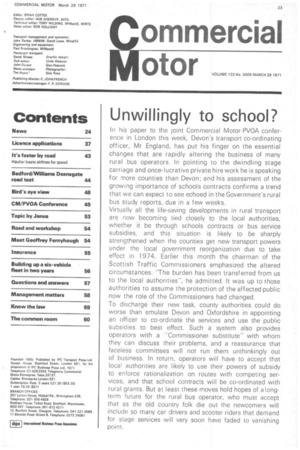Unwillingly to school?
Page 25

If you've noticed an error in this article please click here to report it so we can fix it.
In his paper to the joint Commercial Motor-PVOA conference in London this week, Devon's transport co-ordinating officer, Mr England, has put his finger on the essential changes that are rapidly altering the business of many rural bus operators. In pointing to the dwindling stage carriage and once-lucrative private hire work he is speaking for more counties than Devon; and his assessment of the growing importance of schools contracts confirms a trend that we can expect to see echoed in the Government's rural bus study reports, due in a few weeks.
Virtually all the life-saving developments in rural transport are now becoming tied closely to the local authorities, whether it be through schools contracts or bus service subsidies, and this situation is likely to be sharply strengthened when the counties get new transport powers under the local government reorganization due to take effect in 1974. Earlier this month the chairman of the Scottish Traffic Commissioners emphasized the altered circumstances. "The burden has been transferred from us to the local authorities", he admitted. It was up to those authorities to assume the protection of the affected public now the role of the Commissioners had changed.
To discharge their new task, county authorities could do worse than emulate Devon and Oxfordshire in appointing an officer to co-ordinate the services and use the public subsidies to best effect. Such a system also provides operators with a "Commissioner substitute" with whom they can discuss their problems, and a reassurance that faceless committees will not run them unthinkingly out of business. In return, operators will have to accept that local authorities are likely to use their powers of subsidy to enforce rationalization on routes with competing services, and that school contracts will be co-ordinated with rural grants. But at least these moves hold hopes of a longterm future for the rural bus operator, who must accept that as the old country folk die out the newcomers will include so many car drivers and scooter riders that demand for stage services will very soon have faded to vanishing point.














































































































